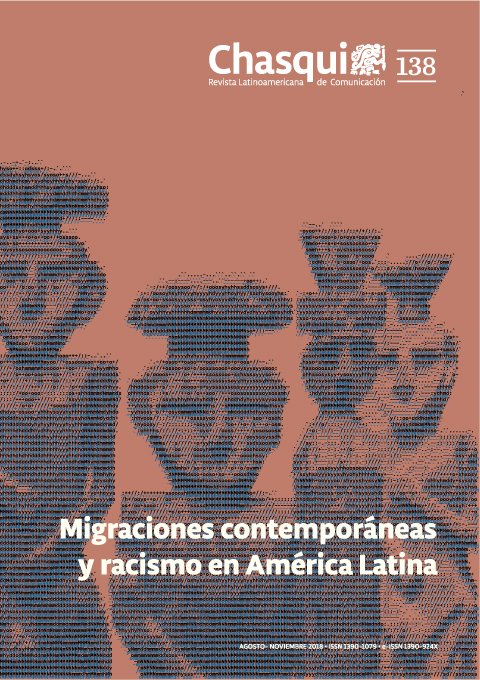Media Rhetoric and Migration. Representations of migration in Post 9/11 New York Times narratives
DOI:
https://doi.org/10.16921/chasqui.v0i138.3630Keywords:
illegal, Mexicans, news, United States, discourse, terrorismAbstract
As a cultural institution, the press plays a fundamental role in documenting and forging the public image of migrants. This paper analyzes two thematic axes in the post 9/11 narrative of the New York Times on migration. The image that was created during the year following the terrorist attacks presents on the one hand the Mexican migrant as a potential terrorist and on the other hand migration as a global problem. It is fundamental to problematize the rhetoric about contemporary migration by inserting it in the ideological roots that defined that moment and in the historical framework of the Mexico-United States relationship. The media rhetoric post 9/11 contributed to the emergence of a new international agenda by globalizing this representation.References
Almaguer, T. (1993). Racial Fault Lines: The Historical Origins of White Supremacy in California. Berkley: University of California Press.
Bhabha, H. & Comaroff, J. (2002). Speaking of Postcoloniality, in the Continuous Present: A Conversation. In Goldberg, D. T. & Quayson, A. (ed.) Relocating Postcolonialism. Blackwell Publishers.
Carvalho, A. (2008). Media(ted) Discourse and Society. Journalism Studies, 9: 2, 161-177.
Castells, M. (2000). The Rise of the Network Society. (2nd ed.). Oxford; Malden, Mass.: Blackwell Publishers.
Conklin Frederking, L. (2012). A comparative study of framing immigration policy after 11 September 2001. Policy Studies, 33:4, 283-296.
Chavez, L. R. (2001). Covering immigration: Popular images and the politics of the nation. Berkeley and Los Angeles: University of California Press.
Chavez, L. R. (2008). The Latino threat: Constructing immigrants, citizens, and the nation. Stanford: Stanford University Press.
De Genova, N. (2002). Migrant "Illegality" and Deportability in Everyday Life. Annual Review Anthropology. 31:419-47.
Entman, R. M. (1993). Framing: Toward Clarification of a Fractured Paradigm. Journal of Communication 43(4), Autumn.
Erlanger, S. (2002, June 21). European Summit Talks Open Today; Focus Is Immigration Control. The New York Times. https://nyti.ms/2Npz4GM.
Guild, E. (2003). International terrorism and EU immigration, asylum and borders policy: the unexpected victims of 11 September 2001. European Foreign Affairs Review. 8.3 (Autumn 2003): p. 331.
Gutiérrez, D. (1995). Walls and Mirrors: Mexican Americans, Mexican Immigrants, and the Politics of Ethnicity. Berkley: University of California Press.
Haines, D. W., & Rosenblum, K. E. (1999). Illegal immigration in America: A reference handbook. Westport, Conn.: Greenwood Press.
Hall, S. (ed.) (2003). Representation: Cultural Representation and Signifying Practices. London: Sage
Inda, J. X. (2006). Targeting Immigrants. Government, Technology, and Ethics. Malden, MA: Blackwell Pub.
Johannsen, R. W. (1985). To the Halls of the Montezumas. The Mexican War in the American Imagination. New York: Oxford University Press.
Lima, L. (2007). The Latino Body: Crisis Identities in American Literary and Cultural Memory. New York & London: New York University Press.
Luther, C., Ringer Lepre, C. & Clark, N. (2012). Diversity in U.S. Mass Media. Wiley-Blackwell.
McChesney, R. (2004). The Problem of the Media: U.S. Communication Politics in the Twenty-First Century. New York: Monthly Review Press.
McCombs, M. (1997). Building consensus: The news media’s agenda-setting roles. Political Communication, 14(4), 433 – 443.
Morley, D. (2000). Home territories media, mobility and identity. London: Routledge.
Mosco, V. & Schiller, D. (eds.) (2001). Continental Order?: Integrating North America for Cybercapitalism. Maryland: Rowman & Littlefield Publishers, Inc.
Ngai, M. M. (2004). Impossible Subjects: Illegal Aliens and the Making of Modern America. Princeton, N.J.: Princeton University Press.
Nightingale, V. (1996). El Estudio de las Audiencias: El Impacto de lo Real. Barcelona: Paidós Ibérica.
Nye, J. (2004). Soft Power: The Means to Success in World Politics. New York: Public Affairs.
Ono, K. & Sloop, J. M. (2002). Shifting Borders: Rhetoric, Immigration, and California’s Proposition 187. Philadelphia: Temple University Press.
Sachs, S. (2001, september 22). A Nation Challenged: Foreign Impact; Attack Took Heavy Toll On Many Countries. The New York Times. https://nyti.ms/2Cr8z2s.
Santa Ana, O. (2002). Brown Tide Rising. Metaphors of Latinos in Contemporary American Discourse. Austin: University of Texas Press.
Saux, M. S. (2007). Immigration and Terrorism: A Constructed Connection: The Spanish Case. European Journal on Criminal Policy and Research 13:57–72.
Schiller, H. (1980). Medios de comunicación e imperialismo. In Silva L. et al. Medios de comunicación, ideología y estrategia imperialista. Universidad Nacional Autónoma de México: México, D.F.
Schiller, D. (2000). Digital Capitalism: Networking the Global Market System. Massachusetts Institute of Technology: Cambridge and London.
Sengupta, S. & Drew, C. (2001, November 12). A Nation Challenged: The Immigration Agency; Effort to Discover Terrorists Among Illegal Aliens Makes Glacial Progress, Critics Say. The New York Times. https://nyti.ms/2Nqzo8a.
Strugatch, W. (2001, 28 October). L.I. @ WORK; Unions Rethink Links to Undocumented Labor. The New York Times. https://nyti.ms/2RzDA8W.
Van Dijk, T. (1996). La noticia como discurso. Comprensión, estructura y producción de la información. Barcelona: Paidós Comunicación.
Downloads
Published
Issue
Section
License
- Authors retain copyright and grant the journal right of first publication with the work simultaneously licensed under a Creative Commons Attribution-NoDerivs License (CC BY-ND) that allows others to share the work with an acknowledgement of the work's authorship and initial publication in this journal.
- Authors are able to enter into separate, additional contractual arrangements for the non-exclusive distribution of the journal's published version of the work (e.g., post it to an institutional repository or publish it in a book), with an acknowledgement of its initial publication in this journal.
- Authors are permitted and encouraged to post their work online.

